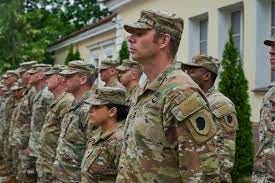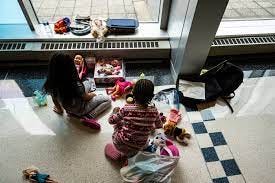Lightfoot's about face is puzzling
When it came to violence she was opposed to the National Guard coming to Chicago

Sixteen months after taking office in May 2019 Mayor Lori Lightfoot was faced with mounting violence in many parts of the city. In September 2020, members of the Chicago City Council’s public safety committee urged Lightfoot to call in the National Guard. Their sentiment was that the Guard’s presence would deter some of the rampant violence. However, the mayor countered their appeal, as did then CPD Superintendent David Brown. Lightfoot also refused the advice of Robert Milan who headed her security team. Milan was a former assistant U.S. Attorney who co-authored a 2017 report that recommended calling in the National Guard to supplement CPD patrols.
This week however, Lightfoot who has five days left in office, issued a state of emergency declaration and called for the Illinois National to establish a presence in Chicago to assist with the growing issue of migrants. These asylum-seekers are being sent to Chicago by Texas Gov. Greg Abbott. Abbott maintains the migrants, most who arriving from Central America, are overwhelming the resources of the Texas towns at or near the border with Mexico. That overwhelming aspect also is Lightfoot’s position about Chicago. She said the city has run out of resources to help the migrants. The city’s estimate is 8,000 migrants have been sent to Chicago since August 2022. Many of those arriving here can now be found sleeping and sheltering inside of Chicago Police Department station houses.
.
Her declaration of a state of emergency allows for additional city funds-an estimated $50 million to be devoted to addressing this issue. In 2020, when the aldermen wanted the call to be made for the National Guard, Gov. JB Pritzker said he advised Lightfoot of the Guard’s availability if she changed her mind. It was not revealed if she has again talked with Pritzker in conjunction with the state of emergency and her declaration about the Guard. Normally, a mayor can only request the Guard be deployed to a city. That request must go to the governor who makes the final determination. The state’s emergency management office in the past noted the Guard should be called in “only after all local resources have been exhausted.”
Lightfoot hasn’t said why she is in favor of the Guard’s presence now, but objected to the council’s suggestion in September 2020. Of course it was possible that as a new mayor she was concerned about damaging her image, and Chicago being looked upon as a city out of control.
Nor is it clear what specific role the Guard could play if they came to Chicago. She has been roundly criticized for moving migrants into the former Wadsworth School in Woodlawn. She faced even more backlash when plans were revealed that the city wanted to use the former South Shore High School as a “respite” center.
One of the slams against the mayor is resources are being devoted to people with no history in this country, and certainly no contributions; and those who have been here all or most of their lives and are needy are being ignored. There is a parallel now that the National Guard was off limits to deal with violence and many residents would have welcomed them; Chicago is asking for them presence when again it involves people who have not lived here or contributed.
It is obvious that when Brandon Johnson succeeds Lightfoot as mayor on May 15 many of his plans will need to be put on hold as he familiarizes himself with the parameters of the state of emergency, as well the fiscal implications of a budget already in the red.




